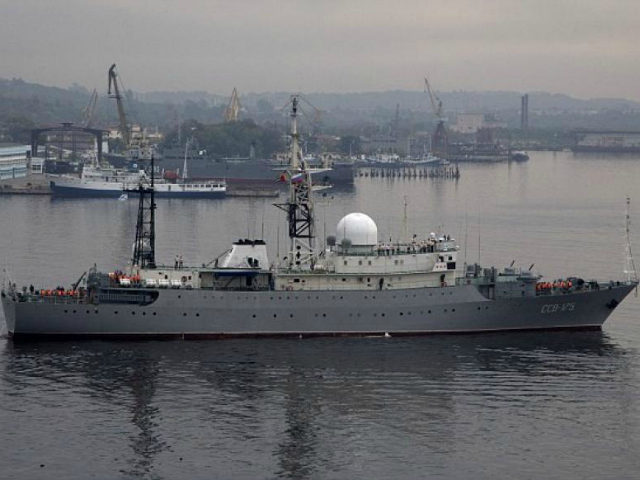Defense consultant Eric Wertheim, author of The Naval Institute Guide to Combat Fleets of the World, joined Breitbart News Daily on Tuesday to talk about the discovery of a Russian spy ship near the U.S. Navy base in Virginia.
“This vessel is one of a few, of roughly a dozen or so, Russian ships – six of which are built to the Vishnya class, which is a Project 864 intelligence collector,” Wertheim told SiriusXM host Matt Boyle. “They have used intelligence collection ships, as many navies have.”
“This ship has gone, and ships like it, to the U.S. coast perhaps once a year, roughly, in recent times – only the last few years,” he continued. “There was a big gap that the Russians did not, after the Cold War, come and visit the shores like they used to. Then in the past few years, the Russian military has been doing quite a massive buildup across the board, and we started seeing these activities pick up.”
“In 2014 and 2015, we saw these kinds of cruises. It can go off the naval bases and off the coasts. As long as they stay outside the border of 12 miles, it’s considered international waters, and they’re free to do what they want, except they can’t get in the way of shipping or do armed things that could cause problems. Outside of that, they’re in international waters. Our ships and NATO ships do similar things outside of Russia,” he said.
Wertheim listed a few activities such intelligence gathering ships might engage in: “One, of course, it’s most obvious, it’s sending a message. When a surface ship goes somewhere, that’s really a presence of that country. That is a sovereign vessel from that country, and it’s sending a message.”
“But it’s also doing more on a tactical level. It could be collecting communications. It has radomes on top. It could be collecting open communications that are discussed. It could be collecting sonar or other information through the back. It’s got sensors. It really is sweeping up any information it could get, packaging it up, and bringing it back home, sending that information back for analysis,” he said.
He said analysts in Russia would distill whatever they could from the mass of raw data collected by spy ships.
“Some of it might be scrambled; they might not be able to do anything with it. Some of it might just be complete open ship-to-ship discussions that you might hear. Some of it might be information from people talking on unsecure lines, things like that. It’s going to be hard to listen in to encrypted communications. That’s going to be a challenge. That’s not so easy to do. It’s more going to be open stuff they’re going to be listening to, to get some idea,” he elaborated.
“Remember, there’s a lot of information you can gather just from listening to open discussions. People talk all the time on open lines at restaurants or things like that. So things could be discussed, but at the same time, it’s also a message, and it could also be detecting underwater communications, underwater movement from ships or submarines, or just monitoring shipping in and out of ports to see what kind of ships are leaving and coming,” he said.
Wertheim did not believe the presence of the Russian spy ship was an “actual threat.”
“It’s armament is not very heavy. It’s not something that, for instance, a U.S. Coast Guard cutter, national security cutter, couldn’t handle, to say nothing of a Navy destroyer or something,” he said. “Instead, it’s really sending a message of a few things.”
“There are a couple of recourses we could do,” he suggested. “We could start sending more assets close to their shores, which could be one of the reasons why they’ve done this in the first place. We’ve sent ships into the Black Sea, or we have NATO ships that go up. Norway has a very impressive spy ship that often goes up into waters near Russia that Russia is not particularly happy about. Those are some of the things that we could do, increase what we do to collect information.”
“Of course, we don’t necessarily have to do this above water. We can do things with submarines. We can do things with other intelligence collection methods,” he added.
Wertheim speculated that Russia might want to “see how the new administration responds and to watch how and who is in control in certain situations.”
“They want to see where the limits are. How close can they get before a response comes? They might want to see how these decisions are discussed and covered as a result of what they do, to see how their actions can impact and to learn about decision-making in the new administration. It could be something like that. Or theoretically, this could just be a regular deployment that is made once a ship finishes a refit or something like that; it goes out and does its job,” he proposed.
“I think the bigger issue is the bigger Russian buildup, the military buildup and activity that we’ve seen, which is part of a holistic change that the Russian military has been undergoing in the past five to ten years,” Wertheim said.
Breitbart News Daily airs on SiriusXM Patriot 125 weekdays from 6:00 a.m. to 9:00 a.m. Eastern.
LISTEN:

COMMENTS
Please let us know if you're having issues with commenting.